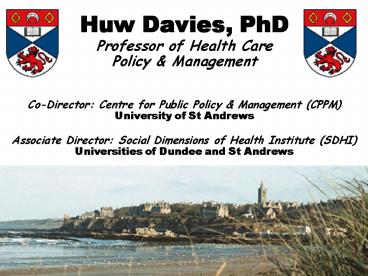Huw Davies, PhD - PowerPoint PPT Presentation
1 / 14
Title:
Huw Davies, PhD
Description:
... appropriate behaviour (and lack of opportunism) - even in the absence of scrutiny. ... Risk of opportunism or even betrayal. Cognitive aspects: role of culture ... – PowerPoint PPT presentation
Number of Views:42
Avg rating:3.0/5.0
Title: Huw Davies, PhD
1
Huw Davies, PhD
- Professor of Health Care
- Policy Management
- Co-Director Centre for Public Policy
Management (CPPM) - University of St Andrews
- Associate Director Social Dimensions of Health
Institute (SDHI)
St A Picture/crest
2
On the Importance of Social Capital in Health
Care Organisation(s)
- a socialised versus a mechanistic view of
organisation(s)
- Organisations as rational, instrumental,
mechanistic agencies heartless arrangements
for getting things done. - Organisations as values-infused mini-societies
driven by social dynamics and concerned with
meaning, power and emotion.
3
those social aspects of organisations and
organising that enable efficient coordination and
production -
The Nature of Social Capital
4
Structured Social Networks
- Who you know-
- Bonding links intra-organisational
- Bridging links inter-organisational
- Density and interconnectedness
- Status of, and expectations about, these
connections ? relational issues
5
Relational aspects
- Trust Reciprocity preconditions for
co-operative behaviour - Sometimes trust is calculative but also often
with a moral component - Built through repeated interactions.
6
- Contractual relationship
Extrinsic motivation
- Trusting relationship
Intrinsic motivation
7
The benefits of trust
- Lower overheads, lower transaction costs
and reduced verification costs. - Improved communication, better
teamwork increased worker
participation, better job satisfaction
and commitment to the organization. - Employee empowerment, and increased innovation
and creative problem solving. - Facilitation of organisational learning.
8
The strange properties of trust
- Trust as a lubricant
- reducing transaction costs and making possible
otherwise uneconomic exchanges - Trust as a glue
- binding parties into longer-term mutually
rewarding relationships - Trust as a stimulant
- fostering organisational learning and promoting
improvements in performance.
9
The risks of trust
- Fragility deterioration to mistrust
- Lock-in to certain modes of operation
stagnation, complacency. - Neglect of appropriate verification.
- Risk of opportunism or even betrayal.
10
Cognitive aspects role of culture
- That which is shared across groups
- shared mental maps or models
- beliefs, values, attitudes, norms of behaviour
- routines, traditions, ceremonies, rewards
- meanings, narratives and sense-making
- Help define legitimacy and acceptability form a
kind of social and normative glue - the
way things are done around here.
11
Social capital always been there in healthcare,
but now more invoked and pressed into service
- emphasis on clinical networks and partnership
working - renewed interest in Human Resources strategies
- pleas for trust and demands for cultural
transformations
We are looking at a major cultural change for
everyone a fundamental shift in culture
clinical governance needs to be underpinned by a
culture that values lifelong learning - A
First Class Service, 1998
12
Social Capital and Impacts on Organisational
Performance?
Social Capital
Performance(s)
13
A Darker Side to Social Capital
- Strong networks and associated cultures can
become exclusionary, cliquish, closed off, and
vulnerable to group think contributing to
inefficiency and raising equity concerns. - They may neglect (or even resist) other
sometimes more appropriate - forms of
coordination, regulation or accountability.
14
Policy Research Implications
- Social Capital Matters! and deserves
investigation for its contribution to health
care production. - Social Capital may be (should be?) the target of
purposive policy interventions. - More often, such impacts will be incidental,
unintended and perhaps unfortunate. - Assessment of such impacts should be integral to
all policy evaluations.































